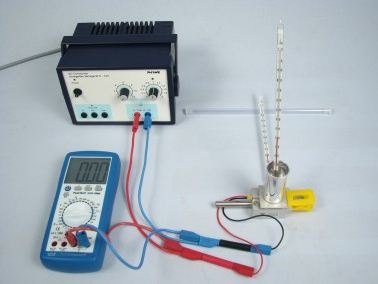Principle
A heat pump is a device which uses mechanical or electric energy to pump thermal energy from a medium A into a medium B. The heat Q conducted to the medium B is greater than the used mechanical or electric energy E0. The Q factor (performance) of a heat pump is described by the so-called "coefficient of performance" ε = Q / E0. It is always necessary to apply ε > 1.
The heat pump is known by the students as an important element for alternative heat-engineering. In this industry, compression heat pumps are primarily used.
In this experiment a Peltier-heat pump is used. The most important quality of a heat pump, that the coefficient of performance is bigger than 1, is also valid here:
The heat pump delivers more thermal energy than utilized electric energy, since it extracts heat from another medium (from the surroundings). For this purpose, solar collectors or geothermal energy, among other things are used.
In the experiment the water heats up while the aluminium block cools down. Thus, the aluminium block takes on the function of the surroundings.
Benefits
- Experiment is part of a complete solution set with a total of 17 experiments for Renewable Energy Basics and Heat energy
- Direct protection of the thermocouple against overheating due to fixed aluminum plates
- Additional aluminum block for storage of heat energy
Tasks
- Is it possible to generate thermal energy while converting electric energy?
- Determine the used electric energy and the produced thermal energy.
Learning objectives
- Heat pump
- Peltier effect


